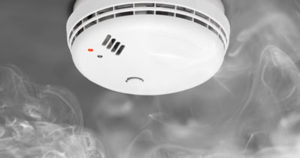It’s Time: Check Your Smoke and Carbon Monoxide Alarms
November 6, 2020 Each year we like to remind our readers how important it is to check their residential smoke and carbon monoxide alarms. Making sure your household alarms are properly installed and working correctly is key in limiting preventable deaths and injuries related to unintentional carbon monoxide poisoning and household fires. If you have not done so already, now is the time to install new batteries in smoke alarms and carbon monoxide detectors.
Each year we like to remind our readers how important it is to check their residential smoke and carbon monoxide alarms. Making sure your household alarms are properly installed and working correctly is key in limiting preventable deaths and injuries related to unintentional carbon monoxide poisoning and household fires. If you have not done so already, now is the time to install new batteries in smoke alarms and carbon monoxide detectors.
Deadly House Fires and Carbon Monoxide Poisoning
Carbon monoxide, or CO, is a colorless, odorless gas that fossil fumes produce when ignited. Oftentimes, people call carbon monoxide the “invisible killer” because we cannot see it or smell it. Carbon monoxide detectors can detect the presence of carbon monoxide, preventing people from deadly and dangerous cases of unintentional poisoning. You should place at least one CO detector on every level of your home as well as inside or outside of each sleeping area. You may install carbon monoxide detectors on ceilings but be sure to avoid putting them directly next to or over flame-producing appliances and fireplaces.
With so many Americans still working or going to school remotely, chances are that more people will be using their home heating systems, portable generators, furnaces, and fireplaces to keep warm during the cooler fall and winter seasons. The CDC reports that approximately 430 people die, 20,000 go to the emergency room and another 4,000 are hospitalized for accidental carbon monoxide poisoning every year. The majority of these carbon monoxide injuries and deaths result from portable generators and residential heating systems, though there are also other lethal culprits. Luckily, it is possible to prevent most accidents that involve CO poisoning simply by installing working alarms in appropriate places and changing their batteries annually. Be sure to test your CO alarms every month.
According to the CDC, there are more than 760 deaths and nearly 3,500 injuries associated with residential fires each year. Similarly to carbon monoxide detectors, people should install smoke alarms inside or outside of every sleeping area on each level of the home. Routinely checking smoke detectors in your home to make sure they are in proper working order is the number one way to stop a house fire in its tracks and to avoid injury. Test your smoke alarms monthly and purchase replacement units when necessary. Here are just a few more fire prevention tips from the U.S. Fire Administration, or USFA:
- Have a qualified professional inspect and clean your chimney and vents each year
- After burning a fire, store cooled ashes in a metal container at least 10 feet away from the home and any other nearby buildings
- Keep flammable materials at least 3 feet away from heat sources like wood stoves, fireplaces, space heaters, and radiators
- Do not plug more than one heat-producing appliance (like a space heater) into an outlet at the same time
- Turn space heaters off when you leave the room
- Do not use an oven to heat your residence
If you are in your home and a fire starts, get out as fast as you can. If you are outside and see that a fire has started, do not enter your residence; call for help.
Defective Products Cause Injury
Some manufacturers fail to fulfill their legal obligation to manufacture and sell safe products, instead endangering consumers. If a smoke alarm or carbon monoxide detector caused an injury due to a manufacturing defect, the failure to provide proper instructions, or an unsafe design, you may be entitled to file a products liability claim. Property owners, businesses, and landlords also have a legal obligation to provide and maintain working smoke alarms and CO detectors in their facilities and/or buildings. If you were injured because of your landlord or employer’s negligence, we can help. To learn more, contact a representative online now.
Philadelphia Products Liability Lawyers at Galfand Berger, LLP Represent Injured Individuals
If you were injured or became ill because of an unsafe or defective product, please contact the Philadelphia personal injury attorneys at Galfand Berger. With offices located in Philadelphia, Bethlehem, Lancaster, and Reading, we serve clients throughout Pennsylvania and New Jersey. To schedule a consultation, call us at 800-222-8792 or complete our online contact form.
 Google Screened
Google Screened
